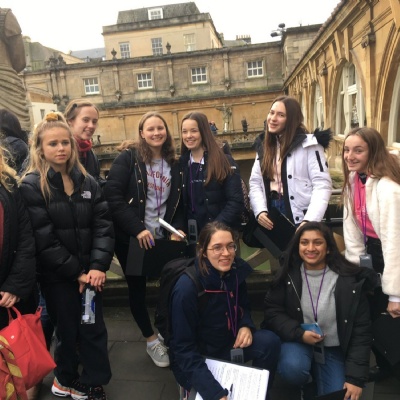Classicists' Trip to Bath

Classicists' Trip to Bath
The historic town of Bath was the destination last week for 10 keen Classicists at King's High who were kindly invited to participate in a collaborative trip with Warwick School, designed to complement the students' study of Romano-Celtic Britain and to heighten their appreciation of the impact that the Romanisation of Britain had on civilisation in this country almost 2000 years ago.
The site of Aquae Sulis, whose name in itself represents a fusion of Roman and Celtic cultures, offered the students the chance to view artefacts used in sacred rituals. Indeed, the number of items that have been found over many years of excavation brought home how truly important the venue was in terms of religious, economic and social significance. The ancient town was indeed a magnet for traders who would have utilised entrepreneurial skills to market goods to worshippers that they then would have had sacrificed on the altar by a priest or soothsayer/haruspex such as Lucius Marcius Memor whose name is included in the famous Haruspex Stone.
The students viewed the beautiful statue of Sulis Minerva as they contemplated how key such an icon was for Celts and Romans as a representation of well-being and hope for those who were ill. The famous Vilbia curse in the form of a tablet or defixio provoked thought on the differences between ancient society and our modern culture but also bonding characteristics that are basically human instincts. The girls were delighted that they had seen for themselves a relict that has inspired some of the stories within their own Latin text book.
From the pioneering wonders of Roman plumbing to the architectural magnificence of the temple facade that boasts the carving of a Gorgon in the style of a Celtic male and cheekily includes a small owl symbolising the link with goddess's ‘USP’-namely wisdom-to the representation of the Greek god of healing, Aesculapius, to the multitude of coins that were offered spanning almost 400 years of history with their imperial denunciations, to a perfectly preserved golden brooch that would have served a decorative as well as practical purpose in holding together the folds of a ‘stola’, the group were certainly kept busy in their thoughts.
As the students moved from room to room within the ‘thermae’ complex they were able to study the engineering behind the all-important daily leisure pursuits that were routine to a Roman or Romanised Briton. Studying the hypocaust system, the Great Bath, the caldarium and the frigidarium which would have provided that essential cool down after a sauna and spa style experience, left the students in no doubt that the Roman invaders made themselves at home in a country that was for them a far cry from their native land; in the words of Horace, a country at the very ends of the earth and, in those of Catullus, home of the Britons at the end of the earth. The educational impact of the day will certainly add value to Latin lessons and will have created fond memories of a Classically driven, enjoyable day out.
